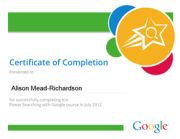Power Searching with Google (Alison Mead Richardson)
Power Searching with Google (Alison Mead Richardson)
 Ms. Alison Mead Richardson, Education Specialist, Technical and Vocational Skills Development
Ms. Alison Mead Richardson, Education Specialist, Technical and Vocational Skills Development
Some of the COL staff have been busy online for the past two weeks with a very interesting course called Power Searching with Google. I've been aware for some time that Google offers far more search features than I know how to use – but I've always been too busy to learn how to get more out of Google and spend less time finding what I'm looking for. So this was a golden opportunity to learn more.
Google describes the course as a blend of the MOOC (Massive Open Online Course) pioneered by Standford and MIT with their social and communication tools to create a community learning experience. I don't know how massive the course was as Google has not revealed how many learners participated in the Power Searching course. For me, there was not much community in it as I didn't participate in any of the forums on Google Groups or Google+ nor did I attend the live "Hangout". But I could have done if I'd chosen to ... and a quick look into the Forum showed me that plenty of people did do the extra activities and report their findings to the community.
Coincidentally, in the same week, we had a visit at COL from Professor T.V. Prabhakar of the Indian Institute of Technology – Kanpur. He is working with our Knowledge Management team on a technical study for COL proposing a core architecture for creating shared virtual infrastructure for Learning for Development organisations. Professor Prubhakar is saying that MOOCs are an important feature in the future of distance learning in developing countries – or rather xOOC where the MOOC technologies and suite of technologies can be scaled down as appropriate – where x = large, small or tiny!
In TVET we talk about the number of jobs that will exist in 2020 that we don't even know about yet and how this challenges the TVET system to be more innovative and focus on learning and problem solving skills rather than packing learners full of facts and information. A great illustration of this is the job title of the facilitator of the Power Searching course, Dan Russell. He's a Search Anthropologist. Google him to find out what he does! So the challenge is on for TVET – how do we train people to do jobs that don't even exist? I believe that part of the answer is in more flexible approaches to TVET which harness the potential of educational media and ICT integration into teaching and learning.
Oh and by the way – are you one of the 90% of people than Dan Russell says don't use CTRL-F to speed up their searches?

